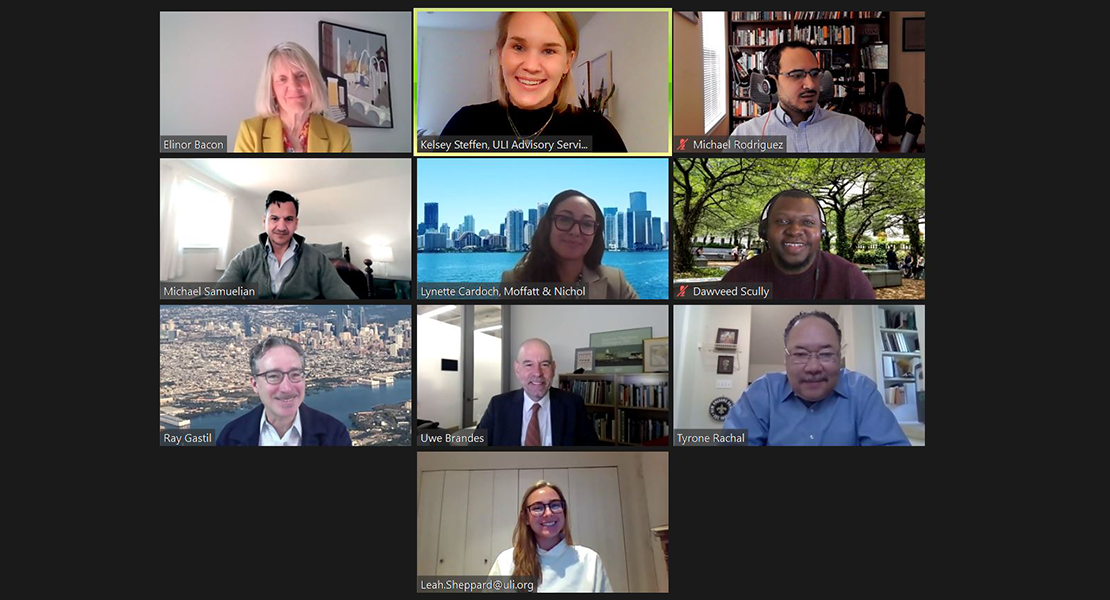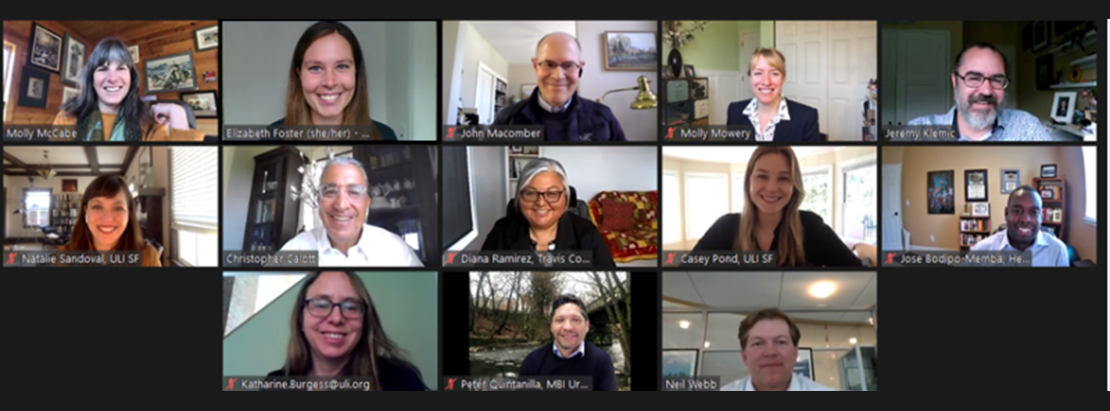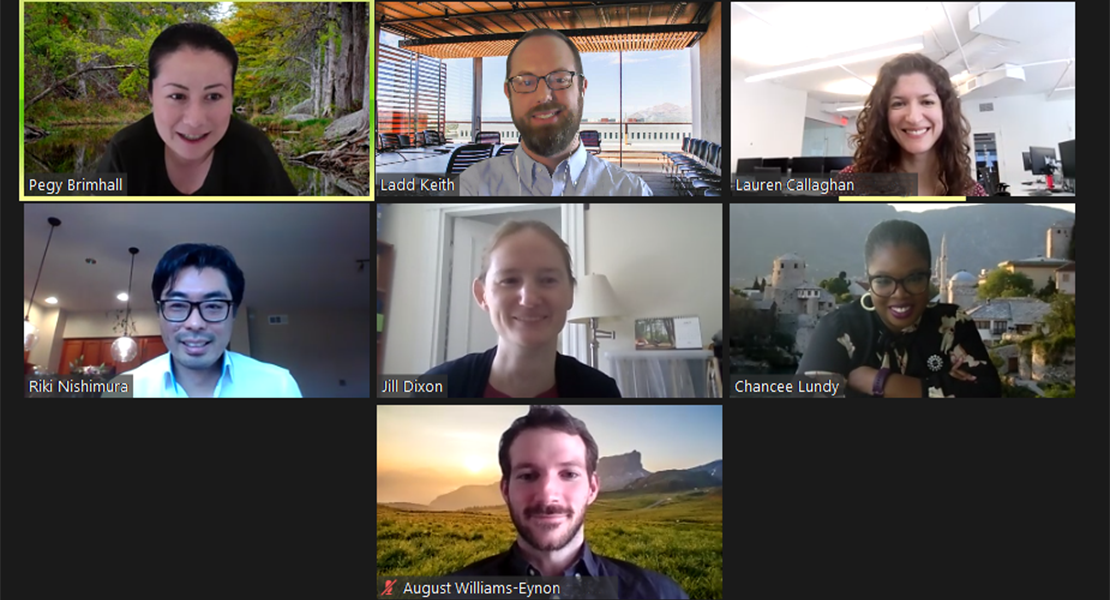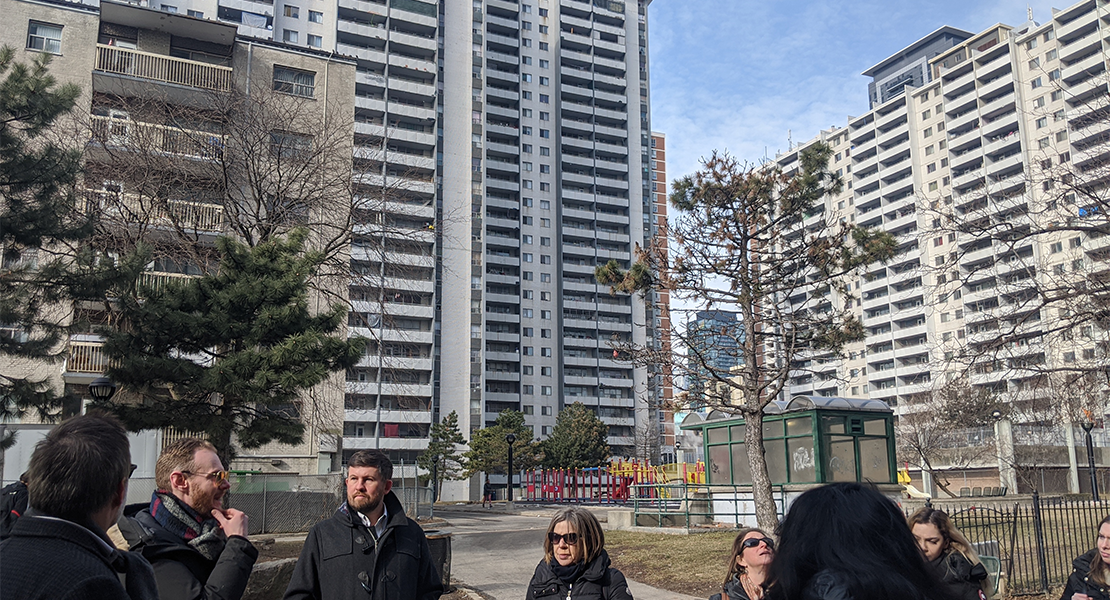ULI’s commitment to sustainability, as exemplified by the Net Zero Imperative, is central to the mission of the institute. In furtherance of this goal, the Advisory Services’ resilience and sustainable development panels equip cities and organizations with the tools needed to prepare and plan for sustainable development and adapt to adverse events exacerbated by climate change.
The Advisory Services program completed three panels in fiscal year 2021 that tackle the complex challenges of resilience and sustainability for Philadelphia, Pennsylvania; Sonoma County, California; and Dallas, Texas.
Philadelphia, Pennsylvania
 The Delaware River Waterfront Corporation (DRWC) asked Advisory Services to provide recommendations and best practices for developing finger piers and incentivizing resilient development in Philadelphia. The DRWC has worked diligently to implement the Master Plan for the Central Delaware. The master plan broadly identified sustainability as a key goal but was unable to get into detail about resiliency best practices and the role those finger piers could play regarding rising sea levels and increasingly frequent and strong precipitation events and storms.
The Delaware River Waterfront Corporation (DRWC) asked Advisory Services to provide recommendations and best practices for developing finger piers and incentivizing resilient development in Philadelphia. The DRWC has worked diligently to implement the Master Plan for the Central Delaware. The master plan broadly identified sustainability as a key goal but was unable to get into detail about resiliency best practices and the role those finger piers could play regarding rising sea levels and increasingly frequent and strong precipitation events and storms.
The panel was asked specific questions about the market realities of the piers and adjacent properties within the study area; how the DRWC might incentivize resilient development on the finger piers; whether the finger piers should remain green/public, what incentives or regulations should be in place to ensure that property owners participate; and best practices for implementing the advised development program and how the developing agencies could update their planning and regulatory documents to ensure resilient redevelopment long term.
Watch the panel’s presentation.
View the panel deliver their recommendations.
The panel was led by chair Uwe Brandes (professor at Georgetown University, Washington, D.C.) and included panelists Elinor Bacon (president, E. R. Bacon Development, Washington, D.C.), Dr. Lynette Cardoch (director, Moffatt & Nichol, Miami, Florida), Raymond Gastil (director, Remaking Cities Institute, Pittsburgh, Pennsylvania), Tyrone Rachal (president, Red Rock Global Capital Partners, Atlanta, Georgia), Michael Rodriguez (lead economist, The MITRE Corporation, McLean, Virginia), Michael Samuelian (founding director, Urban Technology Hub at Cornell Tech, New York, New York), and Dawveed Scully (associate director and senior urban designer, Skidmore, Owings & Merrill, Chicago, Illinois).
The Philadelphia virtual Advisory Services panel is part of a larger series of resilience technical assistance and learning opportunities, called the Resilient Land Use Cohort (RLUC).
The RLUC is a network of ULI district councils, member experts, and community partners in eight cities working together to identify strategies to be more resilient in the face of climate change and other vulnerabilities, including floods, extreme storms, drought, wildfire, and extreme heat, as well as the related social, environmental, and economic impacts. Funding for this engagement and the cohort is provided by the ULI Foundation with support from JPMorgan Chase.
Sonoma County, California

Wildfires are an increasing concern across California. Sonoma County was directly affected by wildfires in 2017, 2019, and 2020, in addition to experiencing significant stress and decreased air quality due to smoke from nearby wildfires. Further, county residents have experienced multiday de-energizations through PG&E’s Public Safety Power Shutoffs in an effort to prevent wildfires from sparking in high-hazard conditions.
Although the threat of wildfires affects quality of life and energy grid reliability, the county and its nine cities are striving to meet state and local climate mitigation goals. The Sonoma Regional Climate Protection Authority invited the ULI panel as part of its efforts to create a comprehensive strategy to plan, fund, and implement effective responses to these increased risks. In its larger efforts to enhance wildfire, energy, and economic resilience in Sonoma County, California, the panel was asked to focus on development policies and strategies, transition from reliability on fossil fuels, funding and revenue models, and interagency collaboration.
Watch the panel’s presentation.
The panel was led by Molly McCabe (HaydenTanner, the Lotus Campaign) and included panelists Jose Bodipo-Memba (Sacramento Municipal Utility District), Christopher Calott (University of California, Berkeley), Jeremy Klemic (SWA), John Macomber (Harvard Business School), Molly Mowery (Community Wildfire Planning Center), Peter Quintanilla (Michael Baker International), Diana A Ramirez (Travis County Planning and Budget Office), and Neil Webb (Ramboll).
The Sonoma County panel is part of a series of Advisory Services panels supported by a generous grant from the Kresge Foundation to advance ULI’s promotion of urban design and development practices that are more resilient and adaptable to the impacts of climate change. With the support of the Kresge Foundation, ULI is leveraging the substantial expertise of its members to provide guidance on the built environment in a way that helps preserve the environment, as well as increase prosperity and foster a high quality of life.
Dallas, Texas

In October 2019, a tornado passed through north and northwestern Dallas, Texas, directly impacting an approximately 16-mile area and damaging or destroying homes, businesses, public facilities, and the tree canopy. According to the city of Dallas, the destruction the storm produced became the costliest tornado in Texas history at $1.55 billion. ULI was asked by the city of Dallas to convene a virtual Advisory Services panel (vASP) focusing on a study area approximately a half mile around the Walnut Hill/Denton Drive Dallas Area Rapid Transit station. The panel was asked to provide recommendations on how to promote greater social cohesion within the study area’s business and demographic populations while promoting climate resilience and environmental justice.
Specifically, the panelists were asked to address what policy and regulatory adjustments should be considered to affect localized investments and broaden the types of small and minority- and women-owned business enterprises in the study area; what types of infrastructure investments would make multimodal transportation easier and more frequently chosen by the area’s residents and workers; what types of design and infrastructure are needed to attract and sustain a growing population of mixed-income residents and to ensure climate resilience and environmental justice; and what stakeholders and organizations need to be brought together to affect the physical environment, economic growth, and quality of life for residents and workers.
Watch the panel deliver their recommendations.
The panel was led by chair Ladd Keith (University of Arizona) and included panelists Pegy Brimhall (principal, Figurd Development, San Antonio, Texas), Jill Allen Dixon (associate principal planner, Sasaki, Boston, Massachusetts), Chanceé Lundy (co-owner, Nspiregreen LLC, Washington, D.C.), and Riki Nishimura (associate principal, Populous, San Francisco, California).
Like the Philadelphia panel, the Dallas virtual Advisory Services panel is part of the Resilient Land Use Cohort. Funding for this engagement and the cohort is provided by the ULI Foundation with support from JPMorgan Chase.
Toronto, Ontario

In February 2020, the Advisory Services program was asked to deliver a comprehensive and actionable set of recommendations to resolve one of Toronto’s biggest housing and resilience challenges: how the public and private sector can work together to unlock necessary investments to drive sustainable retrofits of Toronto’s towers while maintaining affordability.
Aging, purpose-built rental apartment buildings are the backbone of the rental stock in Canada and are home to hundreds of thousands of households with modest and low incomes. Over 500,000 Toronto residents live in about 1,000 towers that are eight or more floors and were built before 1985. Eighty-five percent of these buildings are privately owned. One in three low-income families live in these apartment towers. With rental rates lower than those of newer rental buildings, the housing opportunities in Toronto’s towers provide the “de facto” affordable housing option for Torontonians.
Yet these buildings are now over 35 years old and require substantial investment to continue to be safe, comfortable, and healthy places to live for another 50 years.
Toronto’s resilience strategy identified these buildings as an urgent priority for improving the city’s overall resilience, for ensuring that affordability is maintained, and for housing lower-income populations adequately.
Toronto’s publicly and nonprofit-owned towers have made progress on deep retrofits; however, the goals of continued affordability and expanded investments in retrofits for housing quality and climate resilience do not align in private towers. An enormous opportunity exists to invest in these buildings to achieve multiple goals, including improving tenant livability, decreasing greenhouse gas emissions, improving building and community resilience, and increasing workforce development in low-income areas.
Early observations from the panelists noted that the local housing stock is extremely stressed, with limited new rental stock being built. The panel made recommendations on how to renew the towers for safety, comfort, sustainability, and resilience while maintaining affordability.
The panel was conducted at the invitation of ULI Toronto, in partnership with the city of Toronto and the Tower Renewal Partnership, and with support from the ULI Foundation.
The panel was led by ULI member Jim Heid (founder of UrbanGreen, based in Healdsburg, California). Heid was joined on the panel by Brad Dockser (chief executive officer, Green Generation, Bethesda, Maryland), Billy Grayson (executive director, Center for Sustainability and Economic Performance, Urban Land Institute, Washington, D.C.), Purnima Kapur (former executive director, New York City Department of City Planning, and adjunct lecturer at Columbia University’s Graduate School of Planning and Architecture, New York), Bill Lashbrook (retired former senior vice president, PNC Real Estate, Hopewell, New Jersey), Laura London, (former associate director, real estate development, Arlington Partnership for Affordable Housing, Arlington County, Virginia), and Elizabeth Propp (senior vice president, investments and acquisitions, Community Preservation Corporation, New York).
To bring an Advisory Services panel to your community, contact Advisory Services today.


